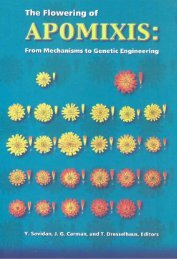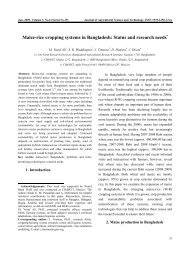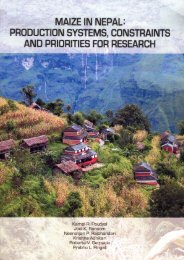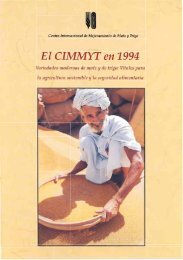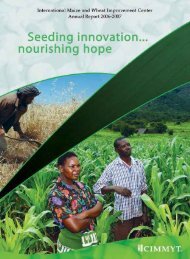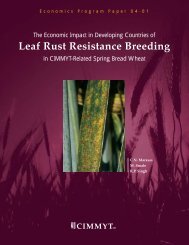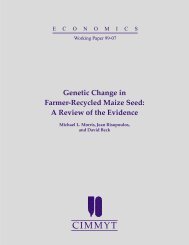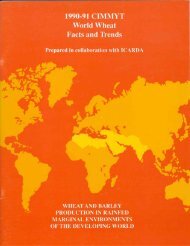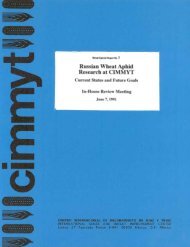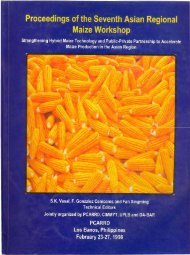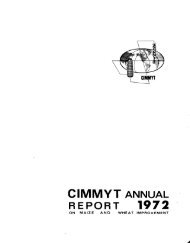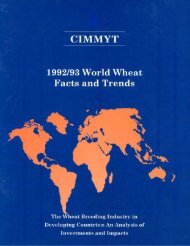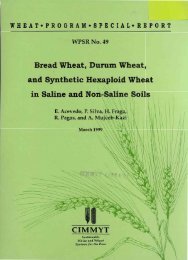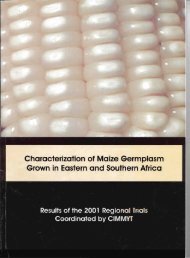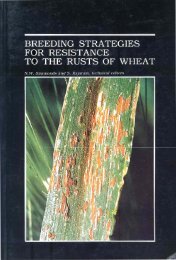the Symposium on Wheats for More Tropical Environments - cimmyt
the Symposium on Wheats for More Tropical Environments - cimmyt
the Symposium on Wheats for More Tropical Environments - cimmyt
- No tags were found...
You also want an ePaper? Increase the reach of your titles
YUMPU automatically turns print PDFs into web optimized ePapers that Google loves.
3 _Keynote Address: <strong>Wheats</strong><strong>for</strong> <strong>More</strong> <strong>Tropical</strong> Envir<strong>on</strong>mentsW.T.llashler. seDlor Director. Divisi<strong>on</strong> <strong>for</strong> Global andIDterregioDal Projects. UDited Nati<strong>on</strong>s neYelopment ProgrammeIt is always a great pleasure <strong>for</strong> me tobe at CIMMYT. as UNDP and CIMMYThave had a l<strong>on</strong>g-standing relati<strong>on</strong>ship ofa special nature with each o<str<strong>on</strong>g>the</str<strong>on</strong>g>r. WhenBob Havener and Arthur Klatt kindlyinvited me to come to this c<strong>on</strong>ference<strong>on</strong> tropical wheat. I readlly accepted <str<strong>on</strong>g>the</str<strong>on</strong>g>invitati<strong>on</strong>. Whlle I have been asked tobe a keynote speaker at this c<strong>on</strong>ference.which is strictly devoted to research <strong>on</strong>tropical wheat. I would also like to giveyou an overview of UNDP's globalagricultural research and relatedactivities. including support to research<strong>on</strong> tropical wheat. To begin with. Iwould like to proVide a brief historicalperspective of <str<strong>on</strong>g>the</str<strong>on</strong>g> Global andInterregi<strong>on</strong>al Programme which I havedirected since its incepti<strong>on</strong> in 1971.The visit of Paul Hoffman. <str<strong>on</strong>g>the</str<strong>on</strong>g> firstAdministrator of UNDP. to <str<strong>on</strong>g>the</str<strong>on</strong>g>Internati<strong>on</strong>al Rice Research Institute in<str<strong>on</strong>g>the</str<strong>on</strong>g> PhUlppines in 1969. and oursubsequent c<strong>on</strong>tacts with CIMMYT. ledto <str<strong>on</strong>g>the</str<strong>on</strong>g> genesis of UNDP's Divisi<strong>on</strong> <strong>for</strong>Global and Interregi<strong>on</strong>al Projects(DGIP). The idea was that UNDP. as <str<strong>on</strong>g>the</str<strong>on</strong>g>world's most broadly based partnership<strong>for</strong> technical cooperati<strong>on</strong>. had both <str<strong>on</strong>g>the</str<strong>on</strong>g>opportunity and <str<strong>on</strong>g>the</str<strong>on</strong>g> obUgati<strong>on</strong> toincrease its involvement indevelopment ef<strong>for</strong>ts with potentiallyworld-wide impact. In January 1970.UNDP's Governing Councll approvedsupport <strong>for</strong> "Global One." aninternati<strong>on</strong>al ef<strong>for</strong>t to develop highproteinvarieties of maize. a food cropimportant in <str<strong>on</strong>g>the</str<strong>on</strong>g> diets of mllli<strong>on</strong>s ofpers<strong>on</strong>s throughout <str<strong>on</strong>g>the</str<strong>on</strong>g> world. Withthis project. UNDP embarked up<strong>on</strong> anew <strong>for</strong>m of development support: basicscientific research aimed at finding newsoluti<strong>on</strong>s <strong>for</strong> old problems. in this case.improved nutriti<strong>on</strong>. This began ourl<strong>on</strong>g-standing and fruitful cooperati<strong>on</strong>with CIMMYT. which in effect helpedcreate <str<strong>on</strong>g>the</str<strong>on</strong>g> c<strong>on</strong>cept of UNDP's globalresearch. <str<strong>on</strong>g>the</str<strong>on</strong>g> results of which could bespread to a wide spectrum ofdeveloping countries. Some years havepassed since "Global One" began fullscaleoperati<strong>on</strong>s and. during this time.UNDP's Global Program has grown intoa worldwide collaborative researchef<strong>for</strong>t of <str<strong>on</strong>g>the</str<strong>on</strong>g> highest scientific quality. Acomplementary program of interregi<strong>on</strong>alactivities is designed to spreadresearch results and to assistdeveloping countries in o<str<strong>on</strong>g>the</str<strong>on</strong>g>r areasrequiring internati<strong>on</strong>al cooperati<strong>on</strong>.Today. <str<strong>on</strong>g>the</str<strong>on</strong>g> combined program spansfive areas of critical importance todeveloping countries:• Food and agriculture• Health. including drinking water andsanitati<strong>on</strong>• Internati<strong>on</strong>al ec<strong>on</strong>omic relati<strong>on</strong>s andec<strong>on</strong>omic cooperati<strong>on</strong> am<strong>on</strong>gdeveloping countries• Energy• Human resources<strong>More</strong> than 100 developing countries areparticipating in projects currentlyunder implementati<strong>on</strong> in <str<strong>on</strong>g>the</str<strong>on</strong>g>se varioussectors.Two basic c<strong>on</strong>victi<strong>on</strong>s underlie all of<str<strong>on</strong>g>the</str<strong>on</strong>g> GloballInterregi<strong>on</strong>al Programme'sactivities. The first is that every seriousdevelopment must be accompanied bya c<strong>on</strong>stant search <strong>for</strong> new knowledgeand new approaches which strike not<strong>on</strong>ly at <str<strong>on</strong>g>the</str<strong>on</strong>g> symptoms but at <str<strong>on</strong>g>the</str<strong>on</strong>g> causesof underdevelopment. The sec<strong>on</strong>d isthat many problems faced bydeveloping countries can be dealt wi<str<strong>on</strong>g>the</str<strong>on</strong>g>ffectively <strong>on</strong>ly within a framework of



